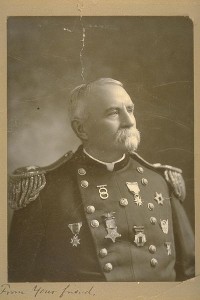I blogged recently about an excellent thumbnail description of Ben Katchor’s artistic heritage which ran on the Los Angeles Review of Books site, and that same site just published the first part of “The Ghost of Wrath,” a revisionist nine-part series about eminent (and hated) Angeleno Harrison Gray Otis that was written by Mike Davis. Otis is the original force behind the Los Angeles Times, and one of the chief “inventors” of modern L.A. The first few paragraphs:
“General Harrison Gray Otis is the wrathful gargoyle with a walrus moustache and Custer goatee who glowers down on us from the battlements of Los Angeles’s Open Shop era. The proprietor of Times-Mirror Company from 1882 to 1917, he was recently hailed in a PBS documentary as the ‘inventor’ of modern Los Angeles, both as an individual and via his descendants, the Chandler family.
Yet his eminence in the city’s history is cast almost entirely as shadow. Five or six serious books have been written about the Los Angeles Times and the Chandlers, but there is no published biography of the dynasty’s founder and leviathan. This is a major missing thread in the narrative tapestry of the current renaissance of Los Angeles history, but given the archival and literary obstacles in any potential biographer’s path, it is not surprising.
First, no one has yet excavated the pharaoh’s tomb. Rumors abound, especially in the tearoom of the Huntington Library, about family archives kept in a San Marino vault. But it is also possible that son-in-law and successor, Harry Chandler, destroyed many of Otis’s private papers when he ordered his own files burned after his heart attack in 1944. (Chandler might have been reacting to the literary and cinematic assaults on fellow-publisher and chief competitor, William Randolph Hearst.)
Second, any biographer has to tackle the fact that Otis was probably the most hated man in Ragtime America. His enemies ecumenically spanned a spectrum from evangelists to citrus growers, socialists to robber barons. Although chiefly remembered for his relentless crusade to destroy the labor movement in Los Angeles, Otis waxed most savage in his attacks on reformers within his own Republican Party. Progressive Republicans, in turn, repaid his vitriol with eloquent interest.”

